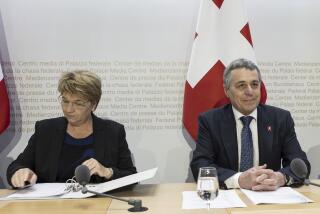Egypt Joins Arab Boycott of Conference
AMMAN, Jordan — In a sharp rebuff to months of intensive U.S. lobbying, Egypt on Tuesday joined the list of Arab nations that will boycott the annual Middle East economic conference scheduled to begin this weekend in the Persian Gulf emirate of Qatar.
Arab allies of the United States have turned their backs on the annual conference, designed to foster Arab-Israeli economic cooperation, in protest against both the breakdown in the peace process since Benjamin Netanyahu became Israel’s prime minister last year and what they believe is Washington’s failure to serve as an honest broker in the region.
Some Arab commentators also have expressed irritation with the United States for its confrontation with Iraq over disarmament.
Although Secretary of State Madeleine Albright will be at the conference opening Sunday in Doha, the Qatari capital, and senior U.S. officials have crisscrossed the Arab world to drum up support, so far only three Arab countries besides Qatar--Jordan, Kuwait and Yemen--are on record as planning to participate.
For the United States, Egypt’s defection is the unkindest cut of all: Egypt was the first Arab country to make peace with Israel, it hosted the conference last year, and it is the second-largest recipient of U.S. foreign aid at about $2 billion a year.
In addition, as the most populous and one of the most prominent Arab countries, Egypt gives political cover to other Arab nations that have been wavering.
Egypt’s position was made final Tuesday when President Hosni Mubarak told his ruling National Democratic Party that Egypt will not send a delegation, although it will allow its ambassador in Qatar to attend at least the opening ceremonies.
Other U.S. friends in the region--including Morocco, Saudi Arabia and the United Arab Emirates--had already decided not to attend.
*
The Arab states say Netanyahu’s 17-month-old Likud government has virtually destroyed the peace process through actions such as expanding Jewish settlements in the occupied West Bank and beginning work on the Har Homa housing project in traditionally Arab East Jerusalem. Many Arabs also accuse the Clinton administration, as Israel’s chief international supporter, of not doing enough to pressure the Netanyahu government to meet conditions of Israeli-Palestinian peace accords.
Albright has called for a “timeout” on settlement activity by Israel, but Netanyahu so far has refused. He argues that the Palestinians--not Israel--have failed to live up to the accords by not cracking down on terrorism.
The United States, more than Israel, has staked its prestige on a successful Doha meeting, arguing that the conference will encourage peace efforts.
Israeli Foreign Minister David Levy is expected to attend, and Israel has long been sanguine about the low level of political participation by Arabs. “Our feeling, in fact, is that it should become more of an economic conference and less of a political one anyway,” Netanyahu advisor David Bar-Illan said Tuesday night.
This year’s meeting already was downgraded to a conference, instead of a summit, when it was clear that no heads of state wished to attend. The unsuccessful U.S. lobbying efforts had been aimed at getting representation at least at the level of foreign ministers.
*
The Middle East and North Africa economic summits--sponsored by the U.S. and Russia and organized by the World Economic Forum--were launched with great fanfare in Casablanca, Morocco, in 1994. They epitomized the hope for a “new Middle East” in which Arabs and Israelis together could reap a peace dividend by joint development and enterprise. The hopes continued in 1995 in Amman, the Jordanian capital, but had already started to fade at last November’s gathering in Cairo.
Bahrain and Oman still are expected to send delegations to Doha--although those plans could change in light of the Egyptian decision. Tunisia and the Palestinian Authority, which have attended in the past, and Syria, Lebanon and Libya, which have boycotted the previous gatherings, have said they will not attend this year’s meeting.
Iraq was not invited.
More to Read
Sign up for Essential California
The most important California stories and recommendations in your inbox every morning.
You may occasionally receive promotional content from the Los Angeles Times.










